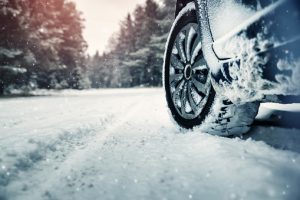 Winter is no stranger to the 207. Raise your hand if you passed your driver's test in a Nor'easter. Or remember navigating city streets or back roads when 16 inches of snow arrived after baseball season had started.
Winter is no stranger to the 207. Raise your hand if you passed your driver's test in a Nor'easter. Or remember navigating city streets or back roads when 16 inches of snow arrived after baseball season had started.
Mainers have confidence behind the wheel in all conditions.
But who doesn't need a reminder to take precautions behind the wheel, especially when the forecast is ominous, or snow is rapidly giving way to ice?
The American Automobile Association - better known as AAA - offers a list of winter driving tips, including:
- Keep your gas tank at least half full to avoid the gas line freezing.
- Make sure your tires are properly inflated.
- Never mix radial tires with other tire types.
- If possible, avoid using your parking brake in cold, rainy, and snowy weather.
- Buckle up.
- Do not use cruise control when driving on a slippery surface.
- Use your seatbelt every time you get into your vehicle.
- Never warm up a vehicle in an enclosed area, such as a garage.
- Accelerate and decelerate slowly. Applying the gas slowly is the best method for regaining traction and avoiding skids. Don't try to get moving in a hurry. And take time to slow down for a stoplight.
- In general, you should drive slower. Accelerating, stopping, and turning take longer on snow-covered roads. Give yourself time to maneuver.
- Know your brakes. Whether you have antilock brakes or not, the best way to stop is threshold braking. Keep the heel of your foot on the floor and use the ball of your foot to apply firm, steady pressure on the brake pedal.
- Don't stop if you can avoid it. There is a big difference in the amount of inertia it takes to start moving from a full stop versus how much it takes to get moving while still rolling. If you can slow down enough to keep rolling until a traffic light changes, do it.
- Don't power up hills. Applying extra gas on snow-covered roads just causes your wheels to spin.
- Avoid driving when you are tired or impaired.
- Pay attention to weather forecasts.
- Always have blankets, gloves, food, water, and any needed medication in your vehicle.
- Should you become snow-bound, stay with your car. It provides temporary shelter and it makes it easier for rescuers to find you. At night, keep the dome light on - it only uses a small amount of electricity.
- Don't overexert yourself if you try to push or dig your vehicle out of the snow.
- Make sure the exhaust pipe isn't clogged with snow or ice. A blocked exhaust could cause deadly carbon monoxide gas to leak into the passenger compartment with the engine running.
- Don't go out in a storm unless you have to.
Remember, you can only take care of yourself. If you've been hurt in a weather-related accident caused by another motorist who didn't take appropriate care, you have legal rights. In case of an accident in any weather, The Law Offices of Joe Bornstein can help all year long.
Our attorneys know the Maine law and have the experience and expertise to handle even the most complex claims. In over 40 years, the Law Offices of Joe Bornstein has helped more than 25,000 injured or disabled Mainers get the justice they deserve. Contact us today for a free and confidential evaluation.



